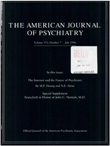Association of age, sex, cognitive dysfunction, and disability with major depressive symptoms in an elderly sample
Abstract
OBJECTIVE: Previous studies have yielded conflicting results regarding the association of age, sex, and cognitive deficit with depression in the elderly. However, there is agreement about a relationship between depressive symptoms and disability. The authors previously conducted a factor analysis of the symptoms of major depression in elderly subjects and found that the symptoms clustered into factors of mood disturbance and motivation disturbance. The aim of the present study was to replicate these findings in a larger population sample and relate some of the variables possibly associated with depression to these two factors. METHOD: A population sample of 1,304 persons aged 75 years or older registered in a parish of Stockholm were examined by physicians to determine DSM-III-R depressive symptoms and disability in activities of daily living. The Mini-Mental State examination was also performed. RESULTS: Factor analysis showed factors of mood and motivation symptoms, and these were related differently to the associated variables. When the other associated variables were controlled for, age was unrelated to both types of symptoms. Women had more mood disturbance, but men had slightly more motivation disturbance. As cognitive function declined, mood disturbance first increased, then decreased. Motivation symptoms increased sharply with decreasing cognitive function. A relationship was found between increasing disability and both the mood and motivation symptoms. CONCLUSIONS: In the elderly, symptoms of depression involve either mood or motivation disturbance and the two types of symptoms are associated with different variables.
Access content
To read the fulltext, please use one of the options below to sign in or purchase access.- Personal login
- Institutional Login
- Sign in via OpenAthens
- Register for access
-
Please login/register if you wish to pair your device and check access availability.
Not a subscriber?
PsychiatryOnline subscription options offer access to the DSM-5 library, books, journals, CME, and patient resources. This all-in-one virtual library provides psychiatrists and mental health professionals with key resources for diagnosis, treatment, research, and professional development.
Need more help? PsychiatryOnline Customer Service may be reached by emailing [email protected] or by calling 800-368-5777 (in the U.S.) or 703-907-7322 (outside the U.S.).



